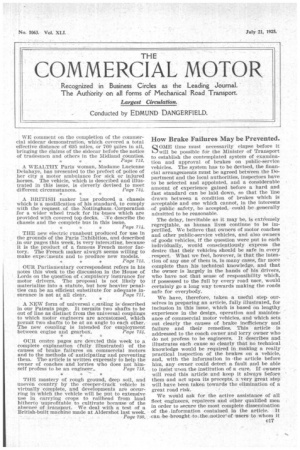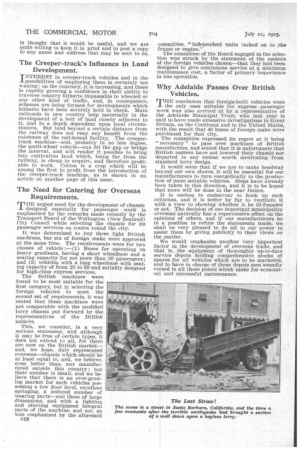How Brake Failures May be Prevented.
Page 1

Page 2

If you've noticed an error in this article please click here to report it so we can fix it.
SOME time must necessarily elapse before it will be possible fOr the Minister of Transport to establish the contemplated system of examination and approval of brakes on public-service vehicles. The system has to be devised, the financial arrangements must be agreed between the Department and the local authorities, inspectors have to be selected and appointed, and a considerable amount of experience gained before a hard and fast standard can be laid down, so that the line drawn between a condition of brakes which is acceptable and one which cannot, in the interests of public safety, be accepted, could be generally admitted to be reasonable.
The delay, inevitable as it may be, is exeemely regrettable, as human lives continue to be imperilled. We believe that owners of motor coaches and other public-service vehicles, and also owners of goods vehicles, if the question were put to each individually, would conscientiously express the desire that their vehicles should be safe in every respect. What we feel, however, is that the intention of any one of them is, in many cases, far more complete than his technical knowledge, and that the owner is largely in the hands of his drivers, who have not that sense of responsibility which, if possessed to the full by every road user, would certainly go a long way towards making the roads safe for everybody.
We have, therefore, taken a useful step ourselves in preparing an article, fully illustrated, for inclusion in this issue, which is based on lengthy experience in the design, operation and maintenance of commercial motor vehicles, and which sets out clearly the causes of brake inefficiency and failure and their remedies. This article is addressed to the coach owner and lorry owner who do not profess to be engineers. It describes and illustrates each cause so clearly that no technical knowledge would be required in making a really practical inspection of the brakes on a vehicle, and, with the information in the article before him, any owner could detect a fault and be able to insist Amon the institution of a cure. If owners will read this article and keep it always before them and act upon its precepts, a very great step will have been taken towards the elimination of a great road risk.
We would ask for the active assistance of all fleet engineers, repairers and other qualified men in order to secure the most complete dissemination of the -information contained in the article. It ,can be -brought .to:.the notice'of users to whom it 017 is thought that it would. be useful, and we are quite willing to keep it in print and to post a copy to any name and address that may be sent to us.
The Creeper-track's Influence in Land Development.
TNTEREST in creeper-track vehicles and in the 1possibilities of employing them is certainly not waning; on the contrary, it is increasing, and there Is rapidly growing a confidence in their ability to traverse country hitherto impassable to wheeled or any other kind of traffic, and, in consequence, schemes are being formed for developments which hitherto have been severely held in check. Main railroads in new country help materially in the development of a belt of land closely adjacent to it, and to a depth dependent upon local circumstances. But land beyond a certain distance from the railway does not reap any benefit from the existence of the rail-bound facility. The creepertrack machine—and, probably in no less degree, the multi-wheel vehicle—can fill the gap or bridge the interval, and will render it possible to bring into cultivation land which, being far from the railway, is cheap to acquire, and therefore profitable to work,. Cotton is a crop which will be among the first to profit from the introduction of the creeper-track machine, as is shown in an article on another page of this issue.
The Need for Catering for Overseas
• Requirements.
THE urgent need for the development of chassis designed especially for passenger work is emphasized by the remarks made recently by the Transport Board of the Wellington (New Zealand) City Council while selecting the chassis for its passenger services on routes round the city-.
It was determined to buy three light British machines, but six of foreign make were approved at the same time. The requirements were for two classes of vehicle :—(1) Buses for operating on heavy gradients, having a short wheelbase and a seating capacity for not more than 20 passengers ; and (2) vehicles with a long wheelbase with seating capacity of from 25 to 30 and suitably designed for high-class express services.
The British machines were found to be most suitable for the first category, but in selecting the foreign vehicles to meet the second set of requirements, it was stated that these machines were not comparable with the modified lorry chassis put forward by the representatives of the British makers.
This, we consider, is a very serious statement, and although it may be true of certain types, it does not extend to all, for there are now on the British market— and, we hope, duly represented overseas—chassis which should be at least equal to, nod, we believe. even better than, any manufactured outside this country ; but their number is small, and we believe that there is an ever-growing market for such vehicles possessing a low floor level, excellent springing, a reduced number of wearing parts—and these of large dimensions, and with a lighting and starting equipment integral parts of the machine, and not, as was emphasized by the aforesaid 018 committee, "independent units tacked on to the frame or engine."
The committee of the Board engaged in the selec-, tion was struck by the statement of the makers of the foreign vehicles chosen—that they had been designed to give continuous service at a minimum maintenance cost, a factor of primary importance in bus operation.
Why Adelaide Passes Over British Vehicles.
THE conclusion that foreign-built vehicles were the only ones suitable for express passenger work was also arrived at by a representative of the Adelaide Municipal Trust, who last year is said to have made extensive investigations in Great Britain, on the Continent and in the United States, with the result that 40 buses of foreign make were purchased for that city. The committee expressed its regret at it being " necessary " to pass over machines of British manufacture, and stated that it is unfortunate that British makers have not lowered their chassis nor departed to any extent worth mentioning from standard lorry design.
It would seem that if we are to make headway beyond our own shores, it will be essential for our manufacturers to turn energetically to the production of more suitable vehicles. Steps have already been taken in this direction, and it is to be hoped that more will be done in the near future.
It is useless to endeavour to hush up such criticism, and it is better by far to ventilate it with a view to showing whether it be ill-founded or not. The decision of one important municipality overseas naturally has a repercussive effect on the opinions of others, and if our manufacturers be in a position to refute the statements made, we shall be very pleased to do all in our power to assist them by giving publicity to their views on the matter.
We would emphasize another very important factor in the development of overseas trade, and that is, the equipment of thoroughly up-to-date service depots holding comprehensive stocks of spares for all vehicles which are to be marketed, and to have in charge of these depots men soundly versed in all those points which make for economical and successful maintenance.
































